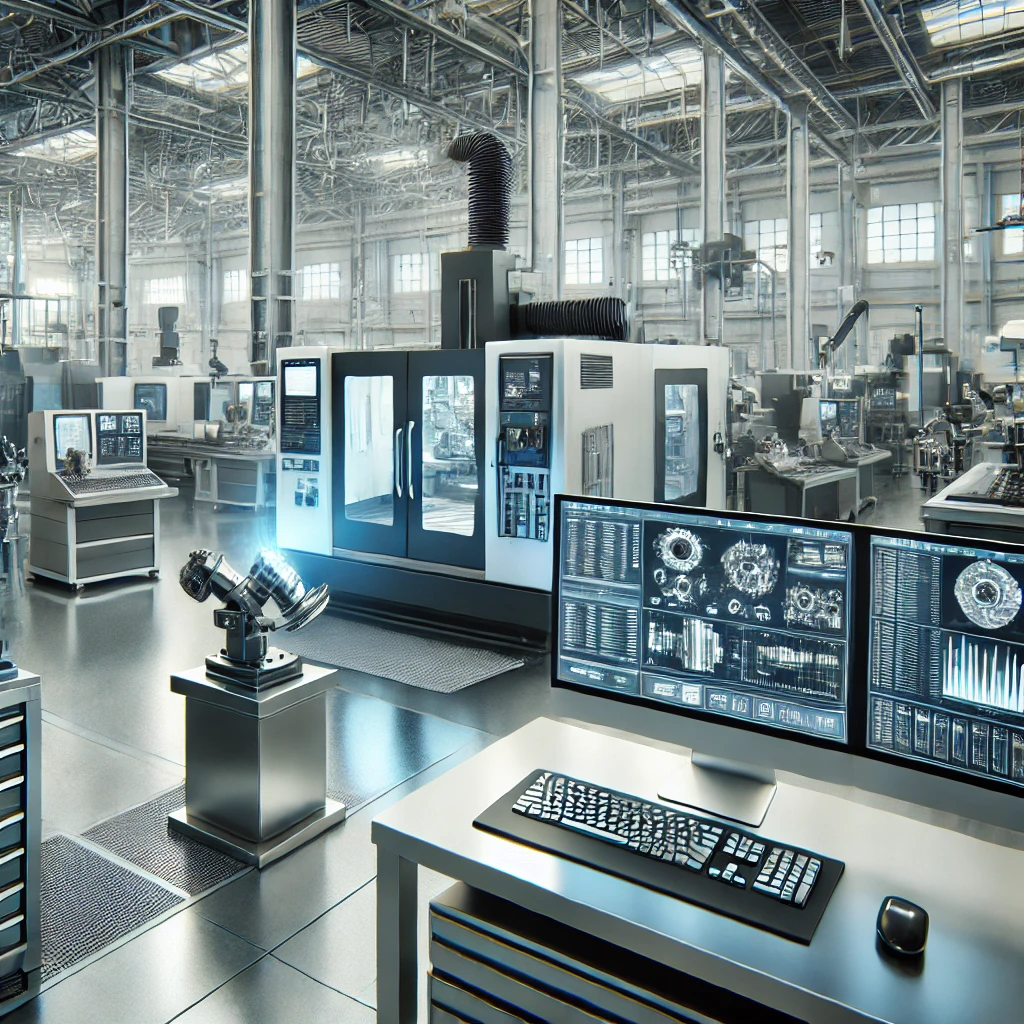Enhancing Precision and Efficiency with CNC Machining
CNC machining has become indispensable to ensure high precision and efficiency in production.
In the competitive world of manufacturing, CNC machining has become essential for achieving high levels of precision in manufacturing and efficiency in production. This technology automates the control of machine tools, allowing for the accurate production of complex parts with minimal human intervention. By ensuring repeatability and tolerance control, CNC machining minimizes errors and optimizes material usage, making it a cornerstone of modern manufacturing processes. This article explores how CNC machining enhances production capabilities and highlights its numerous advantages.
CNC machining minimizes errors in modern production and increases efficiency by optimizing material use.
Fundamentals of CNC Machining Technology
CNC (Computer Numerical Control) machining is a manufacturing process in which pre-programmed computer software dictates the movement of factory tools and machinery. This technology controls a range of complex machinery, such as grinders, lathes, and mills, ensuring precise control over the cutting and shaping of materials.
The working principles of CNC machining involve several key steps:
- Design Creation: A CAD (Computer-Aided Design) model is created to outline the specifications of the part.
- Programming: The CAD model is converted into a CNC program using CAM (Computer-Aided Manufacturing) software, which generates the code that the CNC machine will follow.
- Machine Setup: The CNC machine is set up with the necessary tools and materials. The machine is then calibrated to ensure accuracy.
- Execution: The CNC machine executes the program, guiding the tools to cut, shape, and finish the material according to the precise specifications of the CAD model.
- Quality Control: The finished part is inspected to ensure it meets the required tolerances and specifications.
The Fundamental Differences and Advantages of CNC Over Traditional Machining Methods
Precision in Manufacturing: CNC machining offers superior precision compared to traditional manual machining methods. The use of computer programming eliminates human error, resulting in highly accurate and repeatable production. This precision is essential for industries where exact specifications are critical.
Efficiency in Production: CNC machines can operate continuously and at high speeds, significantly reducing production time. The automation of the process means that CNC machines can run unattended, allowing for overnight and lights-out manufacturing, which maximizes productivity.
Repeatability and Tolerance Control: One of the key advantages of CNC machining is its ability to maintain consistent quality across large production runs. CNC machines can operate with extremely tight tolerances, ensuring that each part meets exact specifications. This level of repeatability is difficult to achieve with manual machining.
Material Optimization: CNC machining minimizes material waste by optimizing cutting paths and depths, which reduces scrap and lowers production costs. This efficient use of materials is both cost-effective and environmentally friendly.
Complexity and Flexibility: CNC technology can handle intricate designs and complex geometries that are challenging or impossible to achieve with manual machining. This capability allows for the production of advanced components with high levels of detail and accuracy.
Integration with CAD/CAM: CNC machines are seamlessly integrated with CAD (Computer-Aided Design) and CAM (Computer-Aided Manufacturing) software, streamlining the design-to-production workflow. This integration allows for quick adjustments and iterations, improving overall efficiency and reducing time to market.
In summary, CNC machining technology represents a significant advancement over traditional machining methods, offering enhanced precision, efficiency, and flexibility. By leveraging CNC technology, manufacturers can produce high-quality parts with greater accuracy and consistency, ultimately improving production processes and product performance.
The Importance of Precision and CNC’s Role
Precision in manufacturing is crucial for several reasons, significantly impacting the quality, performance, and reliability of products. High precision ensures that parts fit together perfectly, which is essential for the proper functioning of complex assemblies. This level of accuracy directly influences product quality, as even minor deviations can lead to defects and failures.
Quality: Precision manufacturing ensures that each component meets exact specifications, resulting in high-quality products. This consistency is vital for maintaining brand reputation and customer satisfaction. Products manufactured with high precision are less likely to have defects, reducing the need for costly reworks and returns.
Performance: The performance of a product often depends on the precise fit and function of its components. High precision in manufacturing ensures that parts operate smoothly and efficiently, enhancing the overall performance of the product. For instance, in automotive and aerospace industries, precision is critical for the safety and performance of vehicles and aircraft.
Product Reliability: Precision in manufacturing directly contributes to the reliability of products. When components are produced with tight tolerances, they are less likely to wear out prematurely or fail during use. This reliability is crucial for industries where safety and longevity are paramount, such as medical devices and industrial machinery.
The High Levels of Precision and Tolerance Control Achieved with CNC Machining
CNC machining technology excels in achieving high levels of precision and tolerance control, which are essential for modern manufacturing. The use of computer programming allows CNC machines to perform intricate cuts and shapes with exceptional accuracy.
High Precision: CNC machines can produce parts with extremely tight tolerances, often within microns. This high level of precision ensures that each part meets the exact specifications required, which is crucial for maintaining the integrity and performance of complex assemblies.
Tolerance Control: CNC machining offers unparalleled control over tolerances. The computer-controlled process eliminates human error, ensuring consistent production quality across large batches. This repeatability is critical for industries that demand exacting standards, such as aerospace, automotive, and medical device manufacturing.
Reducing Error Rates with CNC Machining Technology: The automation and precision of CNC machining significantly reduce error rates. By eliminating manual intervention, CNC machines ensure that each part is manufactured to the highest standards, minimizing defects and enhancing overall quality.
Production of Complex Parts with CNC: CNC technology enables the production of complex parts that would be difficult or impossible to create using traditional machining methods. This capability allows manufacturers to innovate and produce advanced components with intricate geometries and detailed features.
Repeatability Provided by CNC Machining: Consistency and Standardization in Batch Production
One of the key strengths of CNC machining technology is its ability to deliver unparalleled repeatability. In manufacturing, repeatability refers to the capability of producing multiple parts that are identical in dimensions and quality, even across large batches. This consistency is crucial for maintaining product standards and meeting customer expectations.
Consistency: CNC machining ensures that each part is produced to the exact same specifications, regardless of the number of units manufactured. This high level of consistency is achieved through precise computer programming and automated controls, which eliminate variations that might occur with manual machining. Consistent production quality is essential for industries such as aerospace, automotive, and medical devices, where even minor deviations can have significant consequences.
Standardization: The ability of CNC machines to replicate parts accurately enables standardization across production runs. Standardization simplifies assembly processes, reduces the risk of errors during product assembly, and ensures that end products function as intended. By maintaining tight tolerances and uniform quality, CNC machining supports the production of interchangeable parts, which is critical for efficient manufacturing and inventory management.
The Advantages of CNC in Producing Multiple Parts with the Same Dimensions and Quality
Efficiency in Production Processes: CNC machining enhances efficiency in production by automating the manufacturing process. Once a CNC machine is programmed, it can run continuously, producing parts with minimal supervision. This capability significantly speeds up production cycles, allowing manufacturers to meet high demand and tight deadlines without compromising on quality.
Material Optimization: CNC machining optimizes the use of raw materials by precisely controlling cutting paths and depths. This precision minimizes waste and reduces the cost of materials, making the production process more cost-effective and sustainable.
Reducing Error Rates with CNC Machining Technology: The automation and precision of CNC machining greatly reduce error rates, leading to higher-quality products and fewer defects. By consistently producing parts to exact specifications, CNC machines ensure that each unit meets stringent quality standards, reducing the need for rework and enhancing overall efficiency.
Innovations in CNC Machining Technology: Ongoing innovations in CNC technology continue to improve repeatability and production capabilities. Advanced features such as real-time monitoring, adaptive control systems, and improved software integration enhance the performance and reliability of CNC machines, enabling manufacturers to produce complex parts with exceptional accuracy and consistency.
Production of Complex Parts with CNC: CNC machining is particularly advantageous for producing complex parts with intricate geometries and detailed features. The technology’s ability to handle sophisticated designs with high precision makes it ideal for industries that require complex and high-performance components.
In conclusion, CNC machining technology provides significant advantages in terms of repeatability, consistency, and standardization in batch production. By leveraging CNC machines, manufacturers can produce multiple parts with the same dimensions and quality, ensuring high efficiency, reduced error rates, and optimized material usage. These benefits make CNC machining an indispensable tool for modern manufacturing, driving innovation and enhancing production processes.
Flexible Production Capacity
One of the most significant advantages of CNC machining technology is its versatility in handling a wide range of materials and complex part geometries. This flexibility is crucial for manufacturers looking to diversify their production capabilities and meet the demands of different industries.
Material Versatility: CNC machines can work with various materials, including metals (such as aluminum, steel, titanium, and brass), plastics, composites, and even wood. This adaptability allows manufacturers to use the same CNC equipment for different projects, reducing the need for specialized machinery. The ability to machine various materials also opens up opportunities for innovation in product design and application.
Complex Part Geometries: CNC machining excels at producing intricate designs and complex geometries that are difficult or impossible to achieve with traditional machining methods. The precision and control offered by CNC technology enable the creation of detailed features, tight tolerances, and smooth finishes. This capability is essential for industries like aerospace, medical devices, and automotive, where precision and complexity are paramount.
Flexible Capacity Management from Small Batch Production to Large Volume Manufacturing
Small Batch Production: CNC machining provides the flexibility to efficiently produce small batches of parts. This capability is ideal for prototyping, custom manufacturing, and low-volume production runs. CNC machines can be quickly reprogrammed to create different parts, allowing manufacturers to respond rapidly to changing demands or customer specifications without significant downtime or setup costs.
Large Volume Manufacturing: At the same time, CNC technology is well-suited for large-volume manufacturing. Once the machine is set up and programmed, it can operate continuously with minimal supervision, producing large quantities of parts with consistent quality and precision. This scalability ensures that manufacturers can meet high demand and maintain production efficiency, making CNC machining a versatile solution for various production scales.
Flexible Production Scheduling: The flexibility of CNC machining extends to production scheduling as well. Manufacturers can adjust production plans to accommodate urgent orders or changes in demand without significant disruptions. The ability to switch between different parts and production volumes seamlessly enhances overall operational agility.
Cost Efficiency: Whether producing small batches or large volumes, CNC machining offers cost efficiency through reduced labor costs, minimized material waste, and optimized production times. The automation and precision of CNC technology ensure that each part is produced to exact specifications, reducing the need for rework and lowering overall production costs.
Conclusion: A New Era in Industry with CNC Machining
The advent of CNC machining technology marks a new era in the manufacturing industry, bringing unprecedented levels of precision, efficiency, and flexibility. This technology has revolutionized production processes, enabling manufacturers to achieve remarkable results across various applications.
Repeatability and Tolerance Control: One of the most significant advantages of CNC machining is its ability to maintain high repeatability and tight tolerance control. This ensures that every part produced is consistent and meets exact specifications, which is crucial for industries that require high precision, such as aerospace, automotive, and medical devices. The automated nature of CNC machines eliminates human error, further enhancing the accuracy and reliability of production.
Material Optimization: CNC machining optimizes the use of materials by precisely controlling cutting paths and depths, reducing waste and lowering production costs. This material optimization not only makes the process more cost-effective but also environmentally friendly by minimizing scrap.
Reducing Error Rates with CNC Machining Technology: The precision and automation of CNC machining significantly reduce error rates, leading to higher-quality products and fewer defects. This reduction in errors saves time and resources, contributing to more efficient production processes.
Enhancing Production Processes Efficiency with CNC: CNC technology enhances production efficiency by allowing machines to operate continuously and at high speeds. This capability maximizes productivity and enables manufacturers to meet tight deadlines without compromising quality. Additionally, CNC machines can be quickly reprogrammed for different tasks, providing flexibility in production scheduling and capacity management.
Innovations in CNC Machining Technology: Ongoing innovations in CNC machining technology continue to push the boundaries of what is possible. Advances such as real-time monitoring, adaptive control systems, and improved software integration enhance the performance and reliability of CNC machines. These innovations allow for the production of increasingly complex and detailed parts, opening up new possibilities for manufacturers.
Production of Complex Parts with CNC: CNC machining excels at producing complex parts with intricate geometries and fine details. This capability is essential for modern manufacturing, where products often require sophisticated designs and high precision. CNC technology enables the efficient production of these complex components, ensuring they meet stringent quality standards.
Mia Makina’s CNC machining excels at producing complex parts with intricate geometries and fine details. This capability is essential for modern manufacturing, where products often require sophisticated designs and high precision. Mia Makina’s CNC technology enables the efficient production of these complex components, ensuring they meet stringent quality standards.
In summary, Mia Makina’s CNC machining represents a significant leap forward in manufacturing technology. Its ability to provide repeatability and tolerance control, optimize material use, reduce error rates, and enhance production efficiency makes it an indispensable tool for modern industry. As innovations in CNC technology continue to evolve, manufacturers will be able to produce even more complex and high-quality parts, driving further advancements and setting new standards in the manufacturing sector. The era of Mia Makina’s CNC machining has truly ushered in a new era of precision, efficiency, and flexibility in industrial production.
What advantages does CNC machining offer over traditional machining methods?
CNC machining offers higher precision, shorter production time and lower error rates.





